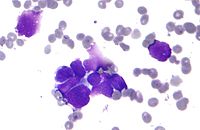
Photo from wikipedia
Importance Merkel cell carcinoma (MCC) often behaves aggressively; however, disease-recurrence data are not captured in national databases, and it is unclear what proportion of patients with MCC experience a recurrence… Click to show full abstract
Importance Merkel cell carcinoma (MCC) often behaves aggressively; however, disease-recurrence data are not captured in national databases, and it is unclear what proportion of patients with MCC experience a recurrence (estimates vary from 27%-77%). Stage-specific recurrence data that includes time from diagnosis would provide more precise prognostic information and contribute to risk-appropriate clinical surveillance. Objective To estimate risk of stage-specific MCC recurrence and mortality over time since diagnosis. Design, Setting, and Participants This prospective cohort study included 618 patients with MCC who were prospectively enrolled in a Seattle-based data repository between 2003 and 2019. Of these patients, 223 experienced a recurrence of MCC. Data analysis was performed July 2019 to November 2021. Main Outcomes and Measures Stage-specific recurrence and survival, as well as cumulative incidence and Kaplan-Meier analyses. Results Among the 618 patients included in the analysis (median [range] age, 69 [11-98] years; 227 [37%] female), the 5-year recurrence rate for MCC was 40%. Risk of recurrence in the first year was high (11% for patients with pathologic stage I, 33% for pathologic stage IIA/IIB, 30% for pathologic stage IIIA, 45% for pathologic stage IIIB, and 58% for pathologic stage IV), with 95% of recurrences occurring within the first 3 years. Median follow-up among living patients was 4.3 years. Beyond stage, 4 factors were associated with increased recurrence risk in univariable analyses: immunosuppression (hazard ratio [HR], 2.4; 95% CI, 1.7-3.3; P < .001), male sex (HR, 1.9; 95% CI, 1.4-2.5; P < .001), known primary lesion among patients with clinically detectable nodal disease (HR, 2.3; 95% CI, 1.4-4.0; P = .001), and older age (HR, 1.1; 95% CI, 1.0-1.3; P = .06 for each 10-year increase). Among 187 deaths in the cohort, 121 (65%) were due to MCC. The MCC-specific survival rate was strongly stage dependent (95% at 5 years for patients with pathologic stage I vs 41% for pathologic stage IV). Among patients presenting with stage I to II MCC, a local recurrence (17 arising within/adjacent to the primary tumor scar) did not appreciably diminish survival compared with patients who had no recurrence (85% vs 88% MCC-specific survival at 5 years). Conclusions and Relevance In this cohort study, the MCC recurrence rate (approximately 40%) was notably different than that reported for invasive melanoma (approximately 19%), squamous cell carcinoma (approximately 5%-9%), or basal cell carcinoma (approximately 1%-2%) following definitive therapy. Because more than 90% of MCC recurrences arise within 3 years, it is appropriate to adjust surveillance intensity accordingly. Stage- and time-specific recurrence data can assist in appropriately focusing surveillance resources on patients and time intervals in which recurrence risk is highest.
Journal Title: JAMA dermatology
Year Published: 2022
Link to full text (if available)
Share on Social Media: Sign Up to like & get
recommendations!